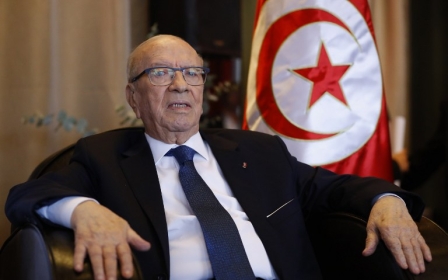Tunisian president’s convoy stoned as protests mark 6th anniversary of uprising

On the sixth anniversary of the Tunisian uprising that inspired Arab Spring revolts across the region, several protests were staged and the presidential convoy was stoned by demonstrators.
Tunisia on Saturday marked the fall of dictator Zine El Abidine Ben Ali without fanfare, after official recognition of failure on the economic and social fronts.
In Tunis, a crowd gathered on Habib Bourguiba Avenue in the presence of political and civil society groups, but local media said no other ceremonies appeared to have been organised elsewhere in Tunisia.
Prime Minister Youssef Chahed acknowledged on national television on Friday night that authorities had so far failed to address the grievances of the Tunisian people that had fuelled the 2011 revolution.
"If we want this democracy to become strong and resistant, we must achieve the economic and social objectives of the revolution, namely the economy and dignity," he said.
"Today, we are not achieving this because unemployment and social inequalities have increased," said Chahed.
President Beji Caid Essebsi on Saturday announced a package of new projects during a visit to the central province of Gafsa.
According to Nessma, a private television channel, however, security forces fired tear gas to disperse protesters hurling stones at Essebsi's convoy.
"The new successive governments have failed to achieve the revolution's demands,” Ahmed al-Mansoury, a Tunisian activist, told TRT World.
“They haven't had a serious will to conduct reformations. They've created ideological conflicts under the excuse of fighting terrorism, the demands of people have been forgotten," he said.
"Since the revolution ended, we have been facing major difficulties,” Adil al-Owainy, an antiques shop owner, told TRT.
“The terror attacks have widely damaged tourism and most of the businesses in Tunisia have been badly affected.”
Tunisia is also the biggest exporter of foreign fighters to Syria and Libya. According to the UN, more than 5,000 left to join militant groups.
High unemployment has left the country's young with little chance of earning a living. And while the home-grown militants fight overseas, the fear is that they'll return and target the fragile state.
Tunisian authorities have struggled to restore the economy and reduce youth unemployment - particularly among new graduates - over the past six years.
An AFP correspondent said dozens of jobless demonstrators in Sidi Bouzid, a town in central Tunisia and birthplace of the anti-Ben Ali uprising, chanted, "Work is a right, bunch of thieves," and other slogans from the revolution.
Similar demonstrations were staged on a road to a nearby town, with protesters burning tyres, and also in Meknassi, near Sidi Bouzid, where a general strike has been declared in protest against the lack of development.
Stay informed with MEE's newsletters
Sign up to get the latest alerts, insights and analysis, starting with Turkey Unpacked
Middle East Eye delivers independent and unrivalled coverage and analysis of the Middle East, North Africa and beyond. To learn more about republishing this content and the associated fees, please fill out this form. More about MEE can be found here.




